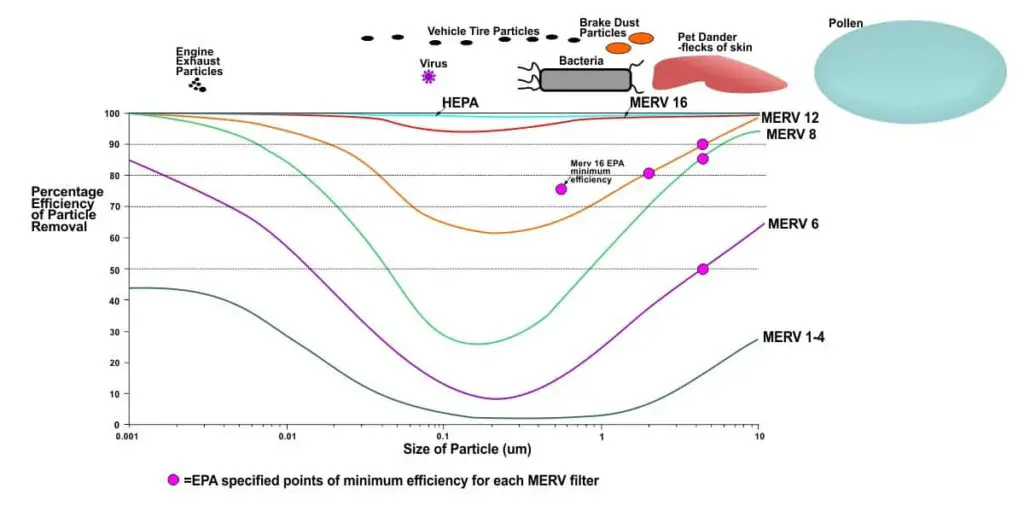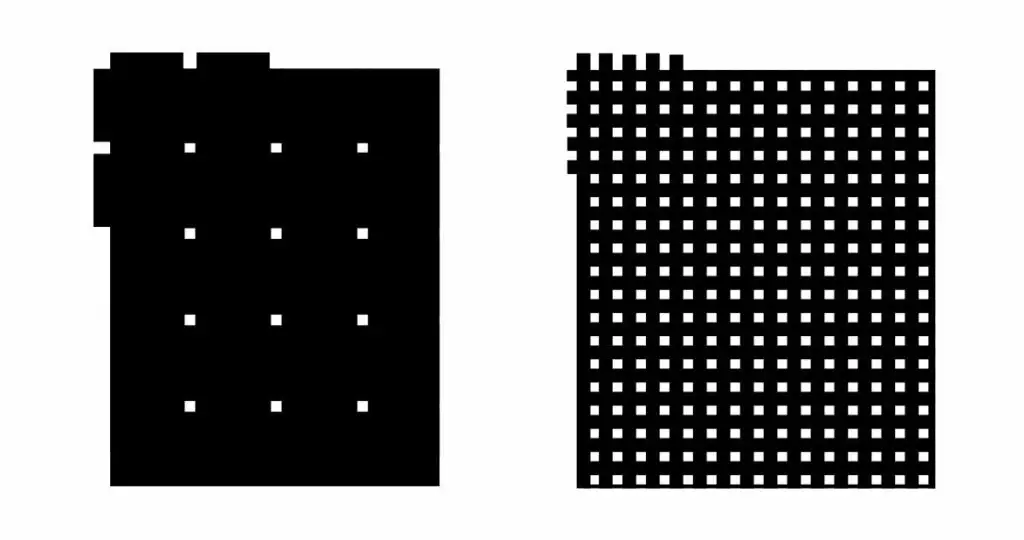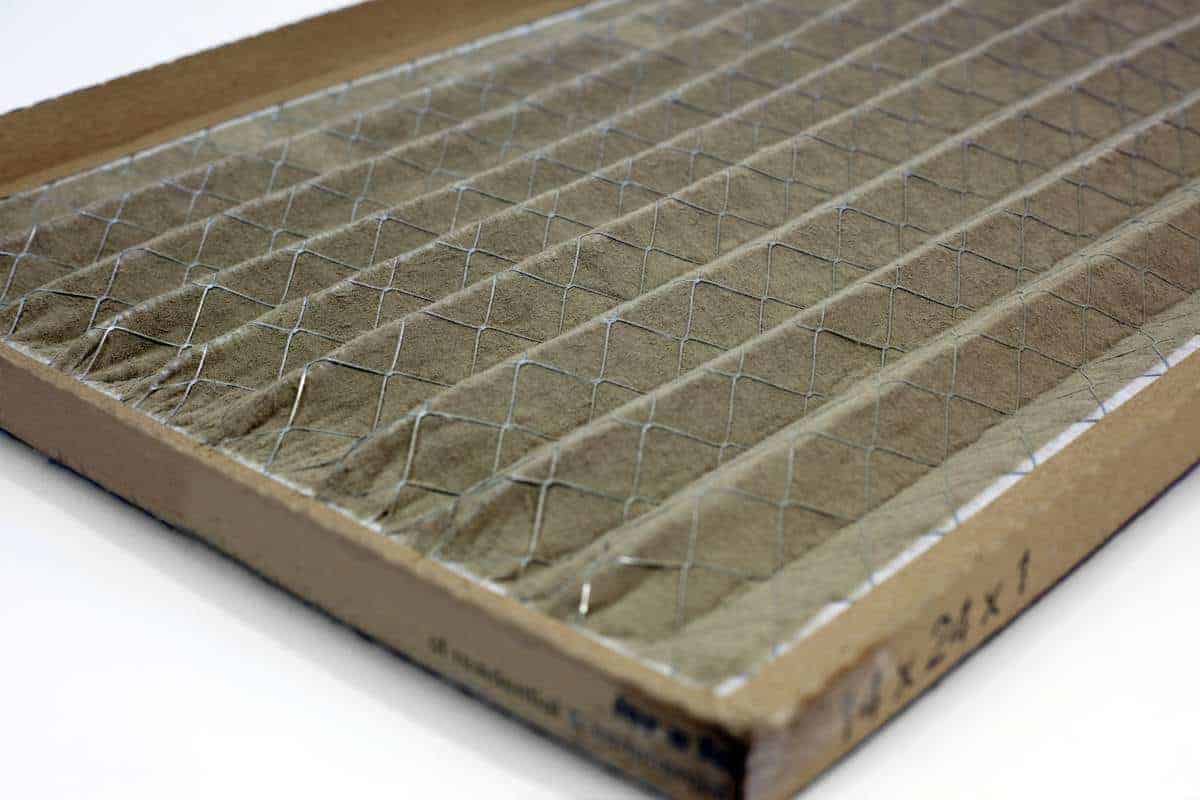I’ve been interested in the different custom HVAC filters and the differences between them. So, I did some research into what factors to look at when choosing a custom HVAC filter and here is what I found. So, are there any custom HVAC filters better than the one that you currently use?
The best HVAC filter type is an HEPA filter. It is the most efficient filter but is not suitable for all HVAC systems. HVAC filters can also be ordered in virtually any size.
The main reason for installing a custom air filter is to improve your air quality. The very basic HVAC filters are really there to protect your HVAC system, not you! The HVAC system does need to keep out large particles, but having done that it wants as easy an airflow as possible so that the fan does not have much work to do and the heating and cooling elements have a good flow of air. So a standard HVAC filter is designed to let air through relatively easily. Unfortunately, this means that it lets through particles that damage human health.
So the main reason that you may want to fit a different or “custom” type of filter is to filter out more particles from the air for your health. Another reason for wanting a custom filter is that you may have a non-standard size HVAC system-I also cover that below.
Custom HVAC filters-filter type
There are 4 types of custom HVAC filters. They are:
- HEPA filters
- Pleated media filters
- Flat-paneled fiberglass
- Reusable filters
Before explaining why HEPA filters are the best, I’ll first explain what a MERV rating is, because this is the key unit used to compare different HVAC filters.
A MERV rating is given to a HVAC filter depending on what percentage of particles it removes from the air. The higher the rating the higher the percentage of particles that the filter removes from the air.
The MERV rating also looks at how well a filter removes particles of different sizes from the air. Lower MERV rating filters don’t remove as many particulates from the air.
Here’s a table that summarizes the MERV rating for the different filters-
| Filter Type | Merv Rating (0-20) |
|---|---|
| HEPA Filter | 17 to 20 |
| Pleated media HVAC filter | 5 to 13 |
| Flat-paneled fiber glass HVAC filter | Less than 5 |
| Reusable HVAC filters | Less than 5 |
| MERV Rating | Efficiency at Removing |
|---|---|
| 1-4 | 3.0-10um less than 20% |
| 6 | 3.0-10um 49.9% or better |
| 8 | 3.0-10um 84.9% or better |
| 10 | 1.0-3.0um 50%, 3.0-10.0um 85% or better |
| 12 | 1.0-3.0um 80-89%, 3.0-10.0um 90% or better |
| 14 | 0.3-1.0um 75-84%, 1.0-3.0um 90% or better |
| 16 | 0.3-1.0um 95% or better |

For more precise information and an accurate graph please see this study
As you can see HEPA filters are so much better than standard filters for removing particles.
1. HEPA filters
High efficiency particulate air filters (HEPA) remove the highest percentage of particulates from the air, and are ideal for people with allergies, and/or respiratory issues.
Filters are tested by the non-profit organization IEST – the Institute of Environmental Sciences and Technology in order to be designated as a HEPA filter.
They are, however, the most difficult to install out of all the filter types, and you should get the help of an HVAC consultant. This is because they have more filter media which causes lowers airflow, which can damage the blower and cooling and heating elements in the HVAC air management unit.
Also, if you’re switching out your current air filter for a new HEPA filter, it can be difficult to source one that will fit, so the best option would be to have your HVAC system remodeled to take standard HEPA filters. It will be too costly to have one specifically designed to fit your system.
Many people have pollen, pet dander, or mold allergies. And this type of filter is the most effective at removing them from the air.
The other problem with HEPA filters is that because the filtration media is thicker, they provide more obstruction to the airflow. This places a greater strain on the air blower which could damage it. Also, the lower airflow can lead to overheating of the heating elements and ice forming on the clearance in the air conditioning unit. So both the cooling and heating elements can be damaged by a lower airflow. So before installing a HEPA filter, you need to consult a qualified HVAC engineer.
What types of HEPA filters are there?
HEPA filters are penetrated most easily by particles that are 0.3 um in diameter. So specifications for filters specify the clearance of these particles that HEPA filters have most difficulty dealing with.
The Institute of Environmental Sciences and Technology has categorized HEPA filters into 6 classifications A, B, C, D, E, or F, according to data provided by the National Air Filtration Association. In the EU they categorize HEPA filters as either E10, E11, E12, H13, H14, U15, U16, U17.
US classification-
ST=Scan test 2FLT=2 flow leak test * particle size 0.1-0.2 um
| HEPA Filter Class | Percentage of Particles of 0.3um Removed | Comment |
|---|---|---|
| A | 99.97% | no ST |
| B | 99.97% | no ST 2FLT |
| C | 99.99% | ST Photometer |
| D | 99.999% | ST Photometer |
| E | 99.97% | ST Photometer 2FLT |
| F | 99.999% | ST Particle counter |
(ST=Scan test 2FLT=2 flow leak test *Particle size 0.1-0.2um)
In the EU they classify HEPA filters into different names based on how many particles they remove from the air, shown in the table below:
| HEPA Filter Class | Percentage of Particles of 0.3um Removed |
|---|---|
| E10 | 85% |
| E11 | 95% |
| E12 | 99.5% |
| H13 | 99.95% |
| H14 | 99.995% |
| U15 | 99.9995% |
| U16 | 99.99995% |
| U17 | 99.999995% |
So HEPA filters are tremendously effective at removing particles from the air but they are more expensive than other filters and are not suitable all HVAC systems.
2. Pleated media filter
These types of filters are made from cotton and polyester. The pleats that give this filter its name increase the surface area of the filter, compared to fiberglass and reusable filters.
If you have to choose between a pleated media filter with more pleats or less pleats, the one with more pleats will perform better.
It makes sense to upgrade from a fiberglass or reusable filter to a pleated media filter if you’re wanting to improve your air quality further. But, don’t necessarily want to pay for a higher priced HEPA filter.
3. Flat-paneled fiber glass filter
This is one of the most affordable custom filters you can buy for your HVAC system. It can be very effective at removing large particles from the air but it will let small particles through relatively easily. So, it will not be helpful in improving the quality of the air enough to improve your health.
For instance, according to data provided by Engineeringtoolbox.com, materials that won’t be filtered out by a flat-paneled fiberglass filter are viruses, smoke from natural materials, and fine clay dust.
The main advantage is that they are cheap.
4. Reusable air filters
Reusable air filters have similar MERV ratings to flat-paneled fiberglass filters, and so aren’t the most effective. The advantage of these kinds of filters is that you can clean them, and so don’t need to buy a replacement. Various air filter cleaning techniques are discussed in this post.
Reusable air filters are the cheapest custom HVAC filter you can use, however, depending on their MERV rating will only remove between 20% and 50% of particles in the air.
Activated Carbon Incorporated Into the Filter Can Remove Odors
Odors are caused by chemicals in the air which sense receptors in our nose detect as smells. These chemicals can be taken out of the air out of the air very effectively by activated carbon until it becomes saturated with chemicals. It works by the activated carbon having molecular attraction for the chemicals and so trapping them. As with air purifiers HVAC filters can use activated carbon to trap chemicals, an example of such a filter is seen here. The amount of activated cardbon that can be incoporated into an HVAC filter is small compared to the volume of air going through it and so the filter will need changing every 3-6 months.
Filter Specification and Viral Particle Removal
Another good reason for upgrading your filter is that there is evidence that a better filter remove more virus from the air. A Merv 5 filter has a 30% efficiency a Merv 13 filter 90% efficiency and a Merv 14 filter 97% efficiency at removing virus particles. Now this is not a guarantee that enough virus has been removed to prevent infection but you can see that there is an enormous difference between the efficiency of a Merv 5 filter and a Merv 14 filter.
Custom HVAC Filters-Filter Structure
There are competing aspects of filter efficiency. You and your family’s health benefit from a filter that is more efficient fat removing particles, but your HVAC system benefits from a low efficiency high flow filter. One solution is to increase the surface area of the HVAC filter. This helps because as the thicker more efficient filter limits the amount of air that can pass through each square inch of filter the overall flow can be increased by increasing the surface area of the filter ie have more square inches of filter.
This is one design for doing this-

By having a “zig-zag” structure, the air is actually going through 4 filters so the surface area is increased 4 fold. In addition, the fibers in these filters are 10 times thinner than standard filter fibers so creating less resistance but still creating an efficient filter. How this works is shown in this diagram-

Custom HVAC Filter-Filter Size
HVAC filters tend to come in several common sizes-
| Usual Filter Size (Inches) | ||
| 10 x20 | 15 x 20 | 20 x 20 |
| 12 x 12 | 16 x 20 | 20 x 24 |
| 12 x 20 | 16 x 25 | 20 x 25 |
| 12 x 24 | 18 x 18 | 20 x 30 |
| 12 x 30 | 18 x 20 | 24 x 24 |
| 12 x 36 | 18 x 25 | 25 x 25 |
| 14 x 20 | 18 x 30 | |
| 14 x 24 | ||
| 14 x 25 | ||
| 14 x 30 |
However, they can be ordered in any custom size to fit your unit. An example of a company offering this facility is Factory Direct Filters although there are many other companies. HEPA filters are very delicate and so damaged by cutting to custom sizes. The length and width is generally cut to the nearest 1/8 inch, and the depth is usually either 1 or 2 inches. So they do not come in custom sizes. Usually, the maximum filtration efficiency material in a custom filter is MERV 13.
Conclusion
The custom HVAC filter you should use depends on how many particulates you would like to remove from the air and the characteristics of your HVAC system. HEPA filters are the most effective, but they are also the most expensive. Pleated media filters are the next most effective filter at removing particulates, followed by flat-paneled fiberglass filters, then reusable filters.
HEPA filters are best for people with allergies and respiratory issues because they will remove the highest percentage of particles causing allergies from the air. They are denser filters that provide more obstruction to the airflow and can cause damage to the HVAC air handling unit-please see this post. Less efficient filters may be used but you should always use the most efficient filter that will not damage your HVAC system.
If you want to use your HVAC system as a giant air purifier you will need to run the air blower continuously.

